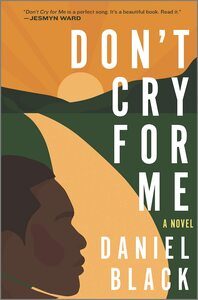Take a photo of a barcode or cover
It’s a gut wrenching book about an estranged father on his death bed. At times it was too hard to read the actions of the father are unspeakable as well as what has happened to him. This book shows we as humans are so much more than our actions. Great book but so hard to read.
A beautifully written book, that was intense and haunting but also so full of forgiveness and deep love. Made me think a lot about what it means to be a parent and all the things we pass on to our children.
challenging
dark
emotional
reflective
sad
medium-paced
Plot or Character Driven:
Character
Strong character development:
Yes
Loveable characters:
Complicated
Diverse cast of characters:
Yes
Flaws of characters a main focus:
Yes
TOP 10 HERE! This book broke my heart, put it back together, and broke it a few more times before it was all said and done. It works so well as letters from a dying man to a son that he realizes he didn't love the way that he should have but in the way he believed he had to. Very much looking forward to a live event with Dr. Black in New Orleans tomorrow (1/18) at Baldwin & Co. in New Orleans and reading Isaac's Song to get this story from his side.
slow-paced
Plot or Character Driven:
Character
Strong character development:
Yes
Loveable characters:
Complicated
Diverse cast of characters:
Yes
Flaws of characters a main focus:
Yes
Having lost my father without the ability have closure, I can very much relate to this entire book. You can feel the remorse, love, and even hope throughout the story. We love an accountability moment! I didn’t feel forgiveness but I did feel understanding.
First read February 20, 2022 rating 4 ⭐️
This is a difficult book to read. It made me ask a lot of questions through tears. How much weight can you place on your upbringing and how it impacts the decisions you make as an adult? Is it completely the individual's responsibility to decide what it is that you need to unlearn and relearn? At what point is forgiveness a lost cause? Is it fair to ask for forgiveness after inflicting unspeakable physical and emotional injury on your most loved ones? Can men change?
This is a difficult book to read. It made me ask a lot of questions through tears. How much weight can you place on your upbringing and how it impacts the decisions you make as an adult? Is it completely the individual's responsibility to decide what it is that you need to unlearn and relearn? At what point is forgiveness a lost cause? Is it fair to ask for forgiveness after inflicting unspeakable physical and emotional injury on your most loved ones? Can men change?
Plot or Character Driven:
Character
Strong character development:
Complicated
Loveable characters:
Complicated
Diverse cast of characters:
Yes
Flaws of characters a main focus:
Yes
challenging
dark
emotional
hopeful
informative
inspiring
reflective
sad
slow-paced
Plot or Character Driven:
Character
Strong character development:
Yes
Loveable characters:
No
Diverse cast of characters:
Yes
Flaws of characters a main focus:
Yes
emotional
reflective
sad
medium-paced
Plot or Character Driven:
Character
Strong character development:
Yes
Loveable characters:
Yes
Diverse cast of characters:
Yes
Flaws of characters a main focus:
Yes
dark
emotional
reflective
sad
medium-paced
Plot or Character Driven:
Character
Strong character development:
Yes
Loveable characters:
Complicated
Diverse cast of characters:
Yes
Flaws of characters a main focus:
Yes
This book made me cry at least five separate times. It was very reminiscent of Alice Walker's The Third Life of Grange Copeland, with central themes of identity, pain, trauma, parenting, fear, regret, and history.
One of the main things I took away from this book, and something I will carry with me for a long time is the notion of leaving this world knowing you tried, even if you failed, at least you tried. “…please tell them I tried. You are free to say I failed, too, for, in so many ways, that is the gospel truth, but at least say I tried”. My heart broke for both Jacob and Isaac, who will never know each other the way they should have.
Another moment I’ll never forget is one that made me stop reading to stare into the blackness outside the metro car window to take it in. It is a powerful and honest truth about generational trauma and the things you do and don’t pass on to your children, whether on purpose or not. “I almost told you everything right then, but I wasn’t ready. You weren’t either, I assumed. But adults are always wrong about children’s emotional capacity. Children don’t carry the weight of history, so their capacity for heavy things might be greater. But few adults believe this, so we pass along only what we think they can bear. Children wonder later why we didn’t tell them everything so they could avoid our mistakes.”
Another moment I’ll never forget is one that made me stop reading to stare into the blackness outside the metro car window to take it in. It is a powerful and honest truth about generational trauma and the things you do and don’t pass on to your children, whether on purpose or not. “I almost told you everything right then, but I wasn’t ready. You weren’t either, I assumed. But adults are always wrong about children’s emotional capacity. Children don’t carry the weight of history, so their capacity for heavy things might be greater. But few adults believe this, so we pass along only what we think they can bear. Children wonder later why we didn’t tell them everything so they could avoid our mistakes.”
Throughout so much of this book, Jacob, the narrator is aware of his shortcomings, knowing that he should embrace his son, or even communicate with him, but he physically can’t. He lives and dies with this regret.
Don’t Cry for Me was such a beautiful exploration of identities and experiences that I personally cannot relate to, so it opened my mind to ideas and values that I don’t often encounter and don’t always comprehend. I thank Daniel Black for writing something this honest and powerful.





